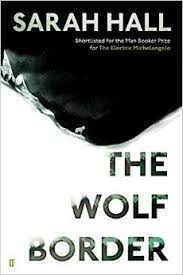 Sarah Hall has been on science fiction’s radar ever since 2008, when her third novel The Carhullan Army, a feminist re-imagining of the near-future dystopia, was shortlisted for the Arthur C. Clarke Award. Those hoping for a similarly explicit exploration of speculative themes in Hall’s new novel The Wolf Border may find themselves disappointed. Yes, the book is set in an alternate near-future, but the differences between this world and our own – or at least those differences Hall chooses to show us – appear undramatic: the Scottish referendum results in a ‘yes’ vote, pound notes still exist. Such divergences aside, the world as we know it today continues unchanged.
Sarah Hall has been on science fiction’s radar ever since 2008, when her third novel The Carhullan Army, a feminist re-imagining of the near-future dystopia, was shortlisted for the Arthur C. Clarke Award. Those hoping for a similarly explicit exploration of speculative themes in Hall’s new novel The Wolf Border may find themselves disappointed. Yes, the book is set in an alternate near-future, but the differences between this world and our own – or at least those differences Hall chooses to show us – appear undramatic: the Scottish referendum results in a ‘yes’ vote, pound notes still exist. Such divergences aside, the world as we know it today continues unchanged.
Hall’s process is more subtle than that, however. The stories in her recent collection The Beautiful Indifference could fairly be classified as ‘realistic’ – as mainstream literary fiction, in other words. And yet. There is a sense of something other there, too, the intercession of the numinous, the speculative, the raw nerve endings of the horrific (I would count her story ‘She Murdered Mortal He’, which contains no supernatural elements whatsoever, as one of the greatest horror stories I have read in recent years). It is to this realm of the speculative – mysterious, unstated, instinctive – that The Wolf Border belongs. As a writer, Hall seems to be growing stronger with each book she publishes. The Wolf Border is unsensationally sensational.
The novel tells the story of Rachel Caine, a woman in her early forties who has devoted her life to the study and conservation of wolves in the wild. She has spent the past ten years in Idaho, tracking the migrations of the native wolves to and from the Canadian forests. Being in America suits Rachel just fine, not only because of her work on the reservation but because her native Cumbria has become a place of regret, family disagreement and troubling echoes from the past. A new job offer, plus a sudden and dramatic change in Rachel’s circumstance brings her home at last. The novel charts Rachel’s personal journey towards a new beginning as naturally as it charts the passage of the seasons. There is drama and there is conflict, there are hidden secrets and reawakened griefs, there is heart-stopping joy. All these things feel real, as the weather of Cumbria feels real and the plight of the wolves feels real. The plot reveals itself as the subset of character, rather than (as so tediously often) the other way around. There is no sense here of artificially upping the ante for the sake of ‘narrative drive’ or ‘jeopardy’ or some other, similarly treacherous commercial convention.
Instead, there are moments of true wonder, and what The Wolf Border reveals most tellingly is the magic that exists in the world, in our own private dialogue with existence, in our relationship with the landscapes that mark us, in the necessity of working out who we are and what we are for. I’m being deliberately unspecific about this novel, because I loved it so much. The most helpful thing I feel I can say about it is that I cannot remember the last time I cared so passionately, so personally, about a story’s outcome. The Wolf Border is the perfect fusion between fiction and reality, between the speculative and the mimetic. Hall brings insight to the commonplace, illuminating and ambushing the real with the revelatory spotlight of hyper-reality. It is such insistent modes of being and seeing that, for me, help to define the core of what speculative fiction is mostly about.